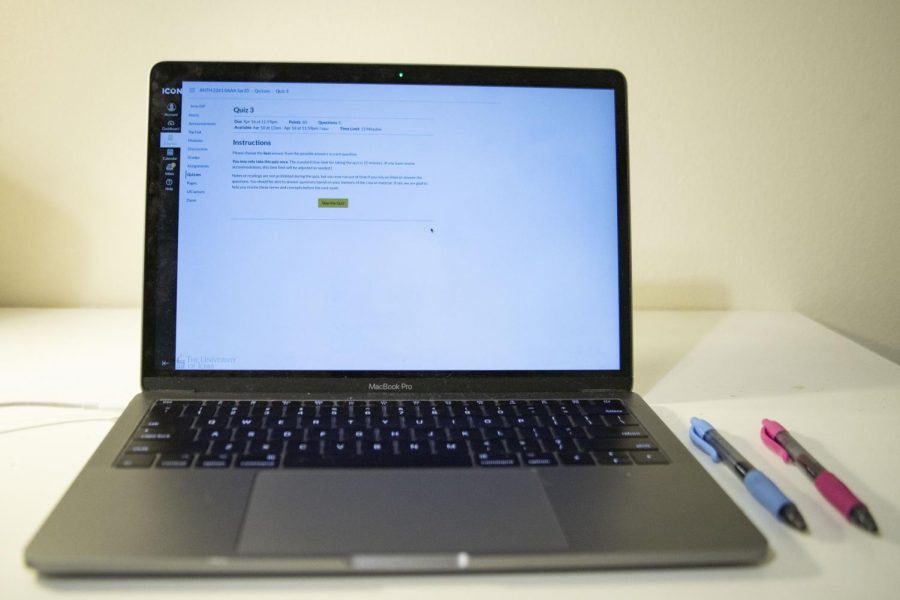Virtual learning changes how professors test students
After the University of Iowa moved to exclusively virtual learning, exam and quiz structures have changed to better accommodate students and ensure they are being held accountable.
Photo Illustration by Jenna Galligan
April 12, 2020
When the University of Iowa moved to a virtual-learning format for the remainder of the semester, it changed the way exams, quizzes, and other forms of testing are administered by different colleges, departments, and professors within the university.
The switch to online examination, which the UI announced in early March as an effort to curb the spread of COVID-19, was difficult for everyone in the equation because it was a first for the majority of students and instructors, said UI Associate Professor of Biology Erin Irish.
Irish said the shift to online classes has made her reexamine the way she will test her students this semester, including the frequency at which she chooses to quiz her classes.
“We’ve been shifting to weekly quizzes so students can still get points that would have been allotted during midterms and exams, but we do it in smaller chunks,” she said. “That has actually helped students. Having less important quizzes is something that keeps students on track better.”
Irish and her colleagues in the UI biology department are still concerned about students cheating on their larger exams. Irish said she has taken steps to ensure that her test questions aren’t found in the index of a textbook — a precaution she intends to continue even after in-person classes resume.
“We write questions in such a way that you can’t just quickly go to your book or note and pull the information out,” Irish said. “If students decide to read to find answers, the clock is ticking against them. The online move has caused me to write questions where it actually tests concepts, when I’d previously just been testing the vocabulary of terms.”
Holding students accountable in this unprecedented time is a concern for everyone, said UI second-year, mechanical-engineering student Jack Sieleman. After just two weeks of online classes, Sieleman said he’s taken various types of tests, and all had a major focus on reducing dishonesty.
RELATED: UI Admissions Office’s efforts to attract prospective Hawkeyes move online
“I’ve had tests where professors have us all in a Zoom meeting so they can check all of our student IDs before emailing us the test,” he said. “We would then take the test while being watched through Zoom before uploading your work on ICON. I’ve also had to use special internet browsers that won’t let you open any other tabs during the exam, so [professors] know that you didn’t cheat.”
Instead of proctoring exams, Tippie College of Business Associate Professor of Instruction Heidi Dybevik said she decided to change the majority of her classes’ major examinations to be open-note and open-book, but timed so students can’t look up all the answers at leisure.
Dybevik said she shares her expectations with students before an exam starts, including how it will be administered and that notes and books are allowed, but conversing with other students is not. She said making this shift takes away any advantage students would have if they cheat on her limited time exams.
UI sophomore Allison Miller is studying accounting and sports and recreation management. She said her professors are moving most of her exams and quizzes to ICON — a change Miller is still getting used to.
“We’re using ICON and only ICON, but we used to have in-person quizzes and exams from my accounting classes,” she said. “The switch was pretty weird, but my professors have been accommodating. We are getting more time on tests and quizzes because previous quizzes we’ve taken online have shown we need more time because we aren’t used to online tests.”
Miller said she has concerns when it comes to the strength of her internet at home, especially in regard to timed exams.
“My WiFi is the worst,” she said. “My siblings and I are all using the WiFi since we’re home from school, so we have to be aware of who’s on the internet. I’ve been kicked out of classes. I’m definitely afraid of having WiFi issues impact my exams.”
Dybevik said she has asked students to contact her if they have any technical issues during an exam — a decision she said has already helped her and her students during exams.
“I told my students to email or call me right away during the exam if they experienced technical problems,” she said. “A few students had isolated issues, but they let me know and I was able to deal with those issues and get them back on track in real time.”
Regardless of the stress of exams and the difficult shifts to virtual learning, Sieleman said that the transition has ultimately been manageable due to the help and kindness of his professors.
“My professors have made their expectations clear, which is helpful,” he said. “Switching exams online has been smoother than I thought possible. It’s different, but we’re figuring it out together.”



